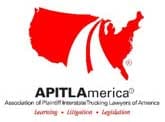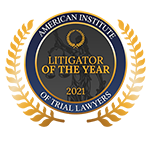Personal Injury Information Center
- Personal Injury — An Overview
Personal injury lawsuits are filed by those who have been injured as the result of another’s intentional, careless or negligent actions. If the injury was so severe that it resulted in a wrongful death, the lawsuit may be filed by the deceased party’s estate or legal representatives. A personal injury typically signifies a physical injury suffered by one at the hands of another, but accompanying emotional injuries are sometimes compensable as well. The vast majority of all personal injury cases are the result of an automobile accident; medical malpractice, product liability, and slip-and-fall cases may also support a personal injury claim. Oftentimes, personal injury lawsuits are defended by insurance companies who may be liable based on the actions of their insured. Our personal injury attorneys are experienced litigators who can help determine who is responsible in your case and help you obtain financial compensation for injuries, lost wages, medical expenses, and pain and suffering. If you are the victim of a personal injury, contact Coleman, Chambers & Rogers, LLP online or call 678-601-2495, for a confidential consultation at our Gainesville office to determine how to hold the people responsible for your injury accountable to you and your family.
- Personal Injury Damages
The experienced personal injury attorneys at Coleman, Chambers & Rogers, LLP, will fight to obtain the financial compensation to which you are entitled under Georgia law as a result of your injuries. Legally compensable damages include physical injury, pain and suffering, lost wages, and past and future medical expenses.
Other types of damages may also be available depending on specific facts and circumstances of a particular case. Most notably, punitive damages may be awarded when the conduct of the person that caused your injury is found by the jury to be malicious, be willful or have acted with such gross negligence as to indicate a wonton disregard for the rights of others. Punitive damages may be awarded if the jury determines that a defendant should be punished for his actions by assessing additional damages exceeding the injured party’s actual damages. In the arena of automobile accident litigation, punitive damages are often sought by attorneys when their clients are injured at the hands of an intoxicated driver.
Additional damages may be available in a wrongful death action. Surviving family members are typically entitled to compensation for the present and future economic loss of the decedent, and they may be entitled to other damages for emotional distress caused by the accident. Financial experts can be used to support a calculation of these damages by employing actuarial tables, statistics, income and employment to determine how much money the decedent would have made in his lifetime. Also, family members close to the victim in a wrongful death action (for example, the decedent’s spouse) may be entitled to damages based on loss of consortium, for the loss of companionship, love and affection caused by the accident, in addition to other damages.
- Georgia Personal Injury Law
A claim giving rise to a personal injury in Georgia is sometimes referred to as a “tort”. Georgia law defines a “tort” as an “unlawful violation of a private legal right other than a mere breach of contract.” The four basic components of a tort include: 1) that the defendant must have a legal duty of care toward the injured party; 2) that the defendant has breached this duty; 3) that the injured party must have incurred some form of injury or harm which will support an award of damages under Georgia law; and 4) that the defendant’s breach must have proximately caused the resulting injuries.
- Negligence And Strict Liability
Intentional torts are those where a tortfeasor causes injury to a person as a result of an intentional act, such as injuries resulting from an assault. The vast majority of personal injury actions are founded upon the theory of negligence, a concept of liability that requires little, if any, criminal culpability. Under the theory of negligence, a defendant is held liable for the result of his actions, when he fails to use the care that an ordinary personal would have exhibited under the same circumstances. Said differently, if an ordinary person under the same facts and circumstances should have foreseen that the relevant conduct would create an unreasonable risk of harm to another, then negligence has been established. Typically, whether the conduct of an individual meets the threshold of negligence is a question of fact that is determined by a jury.
While negligence is typically based on an unreasonable action taken by the defendant, an individual’s failure to act can also be the basis for negligence action. For example, a driver who runs a stop sign and causes an accident that results in injuries to other motorists, passengers or pedestrians is liable for negligence. A property owner who fails to adequately maintain property that is open to the public may be liable for dangerous conditions on the property where they create an unreasonable risk of harm to others. For example, a grocery store owner that fails to adequately clean up a slippery substance from the floor could be liable if a customer falls and is injured while shopping.
Some personal injury actions are founded upon a theory of strict liability, a theory which assigns liability to an individual or entity that causes injuries to another, regardless of the fault of the parties. Strict liability is a theory often utilized in products liability cases, when consumers and users of a product are injured as a result of a manufacturer or seller introducing a defective product into the stream of commerce.
- Defenses To Personal Injury Claims
There are certain situations where a defendant’s actions or conduct, regardless of how egregious, may not support an award of damages. Those accused of negligence will often assert one or more defenses that are commonly accepted under Georgia law to reduce, or in some situations defeat, the amount of recovery or settlement that an injured party may seek as a result of their injuries. The most obvious defense is the statute of limitations, which establishes the time period within which a personal injury lawsuit must be filed. Personal injury claims in Georgia must be filed within two years of the date when the injury occurred, and failure to file a lawsuit within the relevant statute of limitations can prevent the injured party from ever recovering damages from the tortfeasor, regardless of the severity of the injuries.
Another common defense is referred to as “assumption of the risk”, a theory of law founded upon the premise that if an injured party knowingly and willfully chooses to encounter a known hazard, that a tortfeasor may not be liable for injuries, as the injured party has assumed the risk of potential injury as a result of their own actions. For example, an individual who knowingly and voluntarily rides in an automobile with an intoxicated driver may be unable to recover for his injuries resulting from a subsequent accident because he knew of the inherent risk associated with his actions, notwithstanding the negligence of the driver of the automobile. Somewhat related to “assumption of the risk” are the defenses of contributory or comparative negligence. These theories may reduce or diminish a plaintiff’s recovery where her conduct caused or contributed to her injuries, even if her conduct does not rise to the threshold of assumption of the risk.
Also, special attention must be given to cases involving government officials and municipalities. The theory of sovereign immunity insulates some government officials from injuries resulting from their official conduct, and special rules, such as the filing of an ante litem notice, must be complied with when a city, county or any other governmental agency is a named defendant in a tort action. An experienced personal injury lawyer can discuss these and other defenses with you and determine whether they are applicable to your particular facts.
- Conclusion
The experience of an aggressive, seasoned personal injury attorney can be invaluable to the successful resolution of your personal injury claim. Personal injury actions often require an attorney’s careful examination of the facts and circumstances surrounding the incident that gave rise to the injuries to determine which individuals should be made parties to the relevant lawsuit and held accountable for your injuries. A qualified personal injury attorney can meet with you concerning the facts of your case and provide you with an opinion concerning the strength and legitimacy of your personal injury claim, can discuss with you the damages to which you may be entitled, and can discuss other practical aspects of a personal injury claim, including what you should do after an accident, how you should proceed with your doctor visits and medical bills, and how to deal with your employer and document lost wages. Typically, personal injury cases are handled on a contingency fee** basis, which means that you are not responsible for legal fees until the defendant settles the case or pays the award of damages.*
- Trucking Accidents
The use of our state and national highways by tractor-trailers has increased dramatically recently, as have the accidents and fatalities resulting from crashes involving tractor-trailers. The Georgia DOT’s studies have found that crashes involving large trucks and passenger vehicles can be deadly because large trucks cannot stop quickly, they are more difficult to maneuver to avoid a crash and they weigh much more than an average passenger vehicle. The average tractor trailer weighs in excess of 10,000 lbs. From 2000-2006, one in six fatalities in Georgia was the result of a crash involving a large truck.
Several factors may contribute to accidents involving tractor-trailers, including unsafe or negligent operation by the driver, an inexperienced driver, driver fatigue, a poorly-maintained truck, or failure of one of the truck’s motor or mechanical systems. Long hours often contribute to truck drivers being fatigued, and the operation of any motor vehicle by a tired, exhausted or unobservant driver may increase the risk that his or her attention may be diverted from the highway or that his or her judgment may otherwise be impaired, conditions which result in our roadways being less safe. Statistics show that drivers suffering from sleep deprivation are at an increased risk of causing an accident. Crashes caused by these large trucks are often more catastrophic than injuries resulting from a collision of consumer automobiles.
- Car Crashes
The cause of the vast majority of all car crashes can be traced to driver error. A driver whose reckless or negligent conduct causes a fatal car accident may be held liable for wrongful death. Instances of driver error include DUI, alcohol impairment, speeding, failure in obeying traffic signs or signals, failure in accounting for inclement weather or poor road conditions, failure in maintaining lane, texting or using a cell phone while driving, or other activities or behaviors that distract a driver’s attention from the roadway. One or more of these actions by a driver may support a claim for personal injury.
According to NHTSA, in 2008, 37,261 people died in the United States in automobile accidents. In 11,773 of those cases, an alcohol-impaired driver was a contributing factor. Georgia saw 1493 motorists die on its roadways in 2008. According to the Georgia Department of Transportation (DOT), from 2000-2006, almost one million injuries have been sustained by drivers, passengers or pedestrians in Georgia as a result of an automobile accident. During the same period, 11,435 people died in automobile crashes in Georgia, and 42,337 people sustained severe, incapacitating injuries such as paralysis or traumatic head injuries. Since 2000, motorists in Georgia have sustained on average of approximately 130,000 injuries per year as a result of automobile crashes.
The Georgia DOT estimates that unsafe or illegal speed is a contributing factor in one out of every six fatal crashes in Georgia, and that one in four is alcohol related.
- Medical Malpractice
Each year hundreds of thousands of people die as a result of the negligence of their doctors, hospitals or health care providers. Additionally, countless others suffer from complications due to negligent care. Medical malpractice is defined as the failure of your health care professional in following the standard of care in a particular situation, the result of which causes an injury. These injuries may range from moderate to paralysis or even wrongful death.
Medical malpractice claims are often complex and expensive to pursue. Georgia law requires that a suit for medical malpractice be supported by an affidavit from an independent expert (typically another doctor) asserting that the victim’s health care provider did not meet the standard of care required under the particular circumstances of the case. Additionally, attorneys pursuing medical malpractice claims should be familiar with medical terminology and the medical narratives that are often used to support a settlement demand in a medical malpractice case. Due to the complex nature of pursuing a medical malpractice claim, it is important to hire a personal injury attorney experienced with the issues that surface routinely during medical malpractice litigation.
One of the most rapidly growing forms of medical malpractice is the failure to diagnose. Some common examples of these claims include: failure to diagnose heart attacks and strokes, and failure to diagnose variety of cancer, including breast cancer, brain tumors and colon cancer.
Another common basis for a medical malpractice claim includes a doctor who provides negligent care to his patient. This category of medical malpractice would include surgical errors, anesthesia errors, medication errors and the improper care of a surgeon or physician during a routine procedure. Injuries incurred as a result of medical malpractice are often severe, and could include stroke, paralysis, organ failure, spinal cord injury, brain damage, internal bleeding, infection, excess scarring, nerve or muscle damage, and excessive post-surgical pain.
- Products Liability
A variety of different products have been found to be defective, including certain types of seat belts, air bags, tires, brake systems, a variety of prescription and over-the-counter medications, and medical and surgical devices, as well as consumer products such as appliances, tools and toys. Product manufacturers are generally held to a strict liability standard, which means that it is not necessary to prove that the manufacturer of the product was negligent to obtain a successful result. Simply proving that the defective product harmed the plaintiff is usually sufficient to sustain a cause of action.
Perhaps the most recurring instance of potential product liability can be found in the automobile industry. It seems that automobile manufacturers are issuing recalls on vehicles they have introduced into the stream of commerce at an alarming rate. Even though many vehicle manufacturers attempt to engineer their cars to operate safely, motor vehicle accidents still occur on a daily basis at a feverish rate. SUVs have a greater tendency to roll than do other vehicles. Studies have shown that SUVs have the highest rate of rollover in fatal crashes, almost doubling that of passenger cars.
Before a prescription medication can be marketed, it must undergo a litany of clinical tests and trials required by the Federal Drug Administration (FDA). However, the FDA’s approval of a particular medication does not absolve its manufacturer of the responsibility to inform consumers and physicians of a drug’s potential side effects. Defective drugs may have side effects that cause serious injury and harm to those who ingest them. While the FDA will recall those drugs that are proven to be dangerous, sometimes it is too late if the drug has been introduced into the marketplace and distributed to the public. Sometimes, a certain production of a drug that is generally safe is recalled because of abnormalities with the manufacturing of the drug. If you have been prescribed or have taken any of the prescription medications that have been recalled and have suffered an injury, you should contact a personal injury attorney to discuss your case.
- Insurance Claims, Companies And Adjusters
You may ask yourself whether you need an attorney to represent you in connection with your personal injury claim. Perhaps an insurance adjuster has already contacted you and made an offer to resolve your claim. It is important to remember that all insurance companies have attorneys. An insurance adjuster’s goal is typically to minimize the amount paid by the insurance company to an injured victim. The insurance company’s goal is typically to attempt to settle or resolve the claim by paying as little as possible to the injured party. Sometimes, offers of settlement are made prior to the full extent of the injured person’s injuries being discovered. Some injuries may surface after the accident and have lingering effects. These injuries, including “soft tissue” injuries, may last for extended periods of time and result in continuous pain or long-term complications.
While you may be required to speak with your own insurance company concerning your accident, you should consult an attorney to fully understand your rights before making any formal statement to an insurance adjuster, whether from your company or another driver’s carrier. Oftentimes, the assistance and presence of an attorney during an interview or statement will provide the client with the confidence, knowledge and advice that the insurance companies have.
There are several avenues of potential reimbursement for an individual injured in an automobile accident. Examples include auto liability insurance, medical payment coverage on automobile policies, umbrella coverage and health disability insurance. Also, it is important to understand that, even if the responsible party was uninsured or underinsured, an injured party may have the right to make a claim against their own insurance policy by filing an uninsured motorist claim. Sometimes, automobile insurance policies may be “stacked” in an effort to obtain the maximum possible settlement for a party’s injuries.
See our Personal Injury Dictionary for the general definitions for common terms victims encounter when pursuing, or thinking about pursuing, a personal injury claim. Whether your case involves a fall, an automobile accident or some other unfortunate event, you are likely to encounter unique language that is specific to tort law and insurance.
**Contingent attorneys’ fees refer only to those fees charged by attorneys for their legal services. Such fees are not permitted in all types of cases. Court costs and other additional expenses of legal action usually must be paid by the client.
*”You are not responsible for legal fees” refers only to fees charged by the attorney. Court costs and other additional expenses of legal action usually must be paid by the client. Contingent fees are not permitted in all types of cases.
















